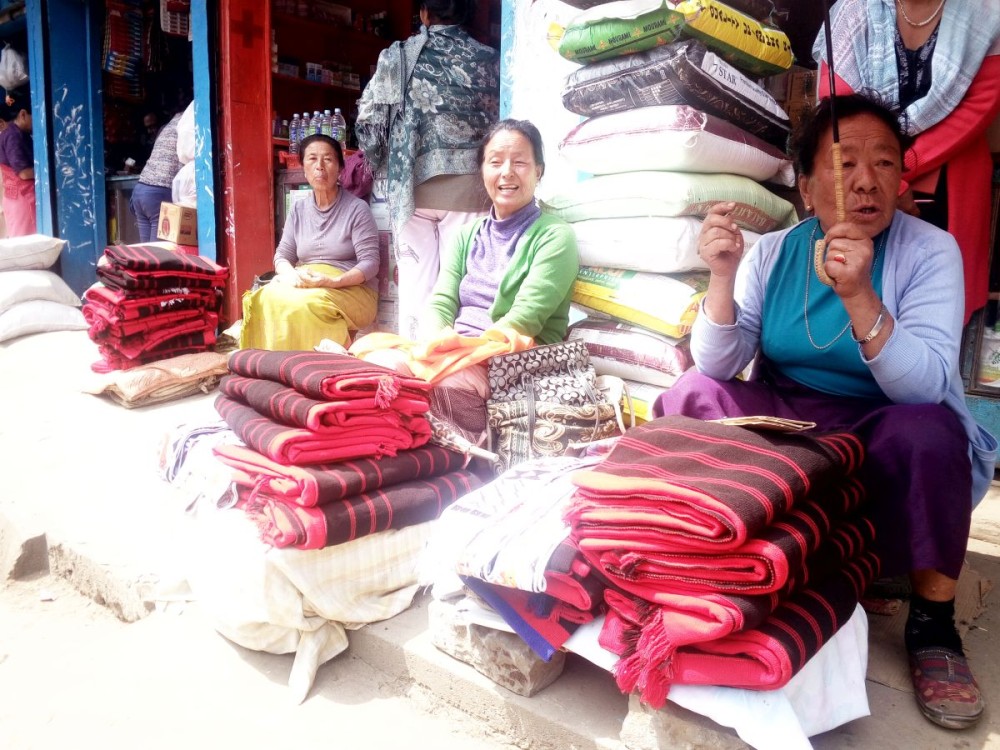Sakulemla, Arenkala and Supenla have been sitting in one of Mokokchung town’s pathway for more than four decades selling hand woven shawls. (Morung Photo)

Limasenla Jamir
Mokokchung | March 7
Anyone who visits Mokokchung town will notice three old ladies seated in a pathway selling traditional hand woven shawls near the MMC shopping complex. These three ladies have been sitting in the same pathway since the 70s. They still continue to do so.
For forty five years, Sakulemla has been selling hand woven Ao Naga traditional shawls in Mokokchung Town. “I started my business on February 7, 1973. I still remember how I collected a week’s wage from working in people’s fields and used it for buying wool to weave shawls,” narrates Sakulemla. “My husband’s meagre wage and the responsibility of taking care of a family of seven children prompted me to start this business.”
Sakulemla is joined by two of her friends, Arenkala and Supenla in the pathway. Together, they have been selling traditional hand woven shawls for more than four decades. “Being a mother, I felt it was my responsibility to help my husband and bring up our children and educate them,” says Arenkala. “This small business has helped me and my family and I can proudly say that my kids have all grown up to be successful,” she adds. A proud mother of three, Arenkala started her small business in 1983.
Supenla’s shawl business story dates back to 1976. When they first started, there weren’t many people dealing in woven shawls. Any day, they would sell 5-6 shawls. “Business is very slow these days. We hardly sell a shawl in a week,” she points out. “Many handloom and handicraft shops have mushroomed up in the town in the past few years and this is also affecting our sale. However, we have some regular customers who have been buying from us for many years and they still do,” she adds.
At 71, Sakulemla and Supenla still recall the major incidents that occurred in Mokokchung town particularly the ‘Ayatai 1994’ and the killing of a ‘major saab.’ They have seen the town grow socially and economically.
Hailing from Ungma village, Sakulemla, Supenla and Arenkala are the only street vendors in Mokokchung town who deals in traditional woven shawls. Supenla laments that the present generation do not know how to weave and that even in the villages; there aren’t many women who weave.
“If only there are women who are as interested as we are in our business, it would help in carrying forward our legacy,” wishes Supenla. She said selling “Supangsu” is not just about them earning but they are also indirectly helping the masses by selling quality products at reasonable rate.
These are three mothers among scores who have taken the responsibility of taking care of their family in their hands and initiated small businesses, which, even after forty years, they are unwilling to quit- even despite an unfavourable market or family members requesting them to discontinue.
Having set their heart and soul in their work, the three mothers are happy to sit and sell their products and is a permanent fixture of Mokokchung town market landscape.
Not only are these ladies known for their shawls, they are also known for their cheerful attitude towards customers. Hundreds of strangers have turned friends. Sitting with them for ten minutes, one notices how popular they are, especially among the old folks.
Forty years ago, it was unimaginable for women to venture out of the houses and engage themselves in other activities other than agricultural works and contributing towards the financial stability of the family.
Just as these “unsung heroines” sitting by the pavement every single day for the past four decades go unnoticed, imagine how many more women must be making such contributions and yet their stories never heard, never told.






